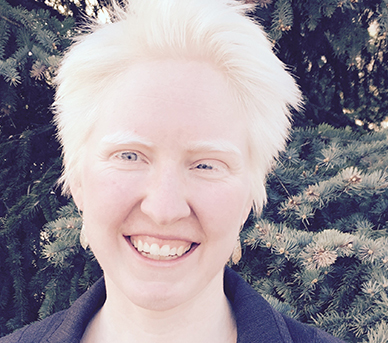Improving Accessibility in Higher Education
Through education and advocacy, MSW student Anna Reid is advancing Universal Design for Learning at GSSW
University of Denver Graduate School of Social Work (GSSW) faculty members often note how much they learn from their students and their experiences. The school certainly is learning from MSW student Anna Reid, an accessibility expert and advocate.
As a student who identifies as blind, advocacy is a role Reid has had to embrace. Higher education often trails behind in accessibility practices and inclusion of those for whom a disability is part of their identity. Many factors contribute to that lag, but the crux is that change is complex, difficult, and often left to individual students to instigate as a one-off accommodation rather than a systemic change.
But systemic change is Reid’s ultimate goal and what brought her to GSSW as an Organizational Leadership and Policy Practice student. Reid’s professional experience spans both micro and macro social work: She worked directly with clients at the Center for People with Disabilities and as a paralegal with the Colorado U.S. Attorney’s Office, where her work focused on civil rights.
“I wanted to be part of helping to address the systemic issues that are so clear in the clinical work,” Reid says.
At GSSW, that has meant advocating not just for individual accommodations — such as providing all reading assignments in a format compatible with technology that converts text on a page into speech — but also for deeper adoption of Universal Design for Learning (UDL) as a standard of inclusive excellence.
UDL is a science-informed pedagogical framework that advocates flexible learning environments that accommodate individual learning differences, not just disabilities. For example, Reid says, students who have learning disabilities or students for whom English is a second language may struggle in a course that grades only on one or two big papers. “Those students may be fabulous critical thinkers and communicators,” Reid says, “but academic writing might be challenging for them.” In a UDL-designed course, students are able to demonstrate their knowledge in alternative ways. “There are still rigorous course objectives, but the student helps identify how they get there.”
It’s an approach that improves learning outcomes for all students, says Reid, who will graduate in June and plans to continue working in the educational accessibility arena.
In 2016, a school work group conducted a survey to better understand the experiences of GSSW community members who identified as having a disability, impairment and/or medical condition (DIMC), to gauge the level of awareness and understanding in the school, and to assess the school’s strengths and areas of growth so GSSW could provide a more inclusive, responsive climate. More than a third of student respondents identified as having one or more types of DIMC, and the work group recommended that the school should make additional efforts to incorporate UDL.
Reid has been collaborating with GSSW on UDL, including proposing a UDL plan for the school, helping to implement a faculty training, and serving as a liaison to the University’s Disability Services Program. “Our aim is to create accessible content and more effective course delivery and assignments for all students,” says Associate Professor of the Practice Kate Ross, co-chair of the school’s Inclusive Excellence Committee.
“Disability often gets forgotten in the conversation about diversity, but it’s a problem to be talking about diversity as silo issues,” Reid adds. “Intersections are critical in terms of access and who can get the access they need.” Part of the promise of the UDL approach, Reid says, is that it is, fundamentally, an anti-oppressive teaching practice. “It’s rooted in the idea that people learn, engage and express themselves in different ways. We have such diversity among students in any classroom. How can we maximize people’s ability to bring themselves to the space?
“UDL helps us think about diversity in all these complex, intersectional ways.”





